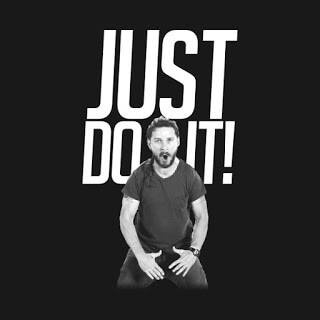If you are thinking of getting into exercise, lifting weights, eating better, losing some weight or improving your health and lifestyle, then read these 5 useful tips to help you get started with your fitness goals.
1. Just start!
There is nothing quite like throwing yourself in the deep end. Whilst I think it can be a good idea to do a little bit of reading and research before you start. It can be difficult to know what is correct and what is rubbish because there is so much misinformation out there in the fitness industry. This makes things very confusing and sometimes over whelming to the beginner. So my suggestion is just get started on something basic. You don’t have to know everything and you don’t have to get it exactly right when you start. Most of us don’t. While I can’t say I ever did anything completely stupid, I did do things that could be improved upon when I started. I’m ok with that and you know what? I’m probably still doing some things that could be improved upon at the moment. Each year I feel that I am learning more and I can look back at the previous year and see where I went a little wrong. That’s part of the journey and you need to be ok with not having all the answers. So again the best advice I can give is to just start, use your common sense and then learn as you go.
2. Do your research and learn
When I first started training with weights I was already coming from a background of athletics and martial arts. So I was far from being completely new to exercise and I was used to body weight resistance exercise already. However I was completely new to resistance exercise with weights. Now being a 16 year old at the time I certainly didn’t have access to the information that I do today. So how did I learn?
– I watched others at the gym, particularly bodybuilders and how they did the exercises.
– I read the instructions on each machine for how the exercise is performed.
– I borrowed some bodybuilding VHS tapes from an older friend and watched them many times until I had a good idea of how to perform the exercises shown on them
– I purchased Arnold’s Encyclopedia of Bodybuilding and read it
– I researched exercise options and technique online (at the time I used www.bodybuilding.com)
– I learned about musculoskeletal anatomy
Now by today’s standards some of this might not be considered the best ways to learn because some of the information from these sources is outdated, less than ideal and unreliable. But for that point in time it was pretty decent and allowed me to make some reasonable progress in a safe way. I’d also like to throw in that even though I didn’t do this, doing some technique sessions with a personal trainer can be quite valuable for someone new to weight training.
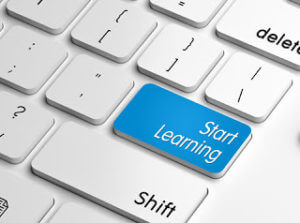
I suppose my point is when you are new to training there are lots of things to learn and lots of ways you can learn them. Sure there are evidence based methods for training and nutrition which I would encourage everyone to seek out so that you don’t waste your time doing things that are inefficient. But when you are starting you should probably first prioritise: (a) training with a consistent and sustainable routine, (b) learning how to do exercises correctly so that you stay healthy and uninjured. After you’ve got (a) and (b) down then start looking at how you can structure everything better.
3. Stop looking for the easy way out
Realise that there is no easy way to achieving anything substantial. You might not want to be a world champion and that is absolutely fine but doesn’t mean different rules apply to you. You still need to put in hard work consistently to get results. One of the most common things I hear from people who look the same or worse as time goes on is “I don’t want to get too big”. What someone is really thinking when they say this is “to get big you clearly have to put in a lot of work, so if I put in just a little bit of work I’ll probably achieve my goal of improving my body composition moderately”. What actually happens is these people end up half assing everything on an inconsistent basis and they achieve nothing and sometimes they actually go backwards. They have under estimated the work required to get the results they want. Dedicate yourself to your goal, no matter how small. I’m not saying get obsessed with it but realise you need to put in consistent hard work to get results, not occasional mucking around. Make a commitment to it and you’ll get it done.
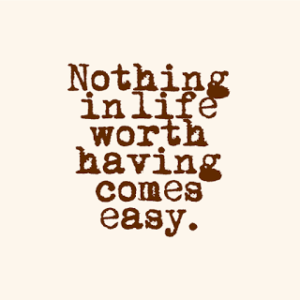
The other thing I want to talk about here is supplements. Lots of emphasis is placed on these by beginners sometimes because of (a) marketing and misinformation and (b) it sounds like an easy solution. There are some supplements that do have a small effect but for the most part supplements do very little and some do nothing at all. When you are starting out you could probably avoid supplements all together and just focus on what you can learn about training and nutrition. You’ll save money doing things this way and still get substantial results. However if you are wondering about supplements a good place to start is by searching for the ingredients of the supplement you are interested in on http://www.examine.com and seeing whether there is any evidence backing them. The worst thing you can do is walk into a supplement store uninformed and rely on the sales assistant for advice.
4. Be realistic
As I eluded to above, one of the keys to achieving results is to be consistent. That means what you are doing needs to be sustainable. If what you are doing involves extreme changes that you’ll only be able to sustain for a few weeks and doesn’t fit in with your life then it’s going to be fruitless. Instead make smaller changes and make sure you can commit to them. For example going from doing no exercise to exercising 6 days/week might be difficult to maintain especially if you already have a busy schedule. But maybe you could commit to exercising 3 days per week for 1 hour. Even though the second option sounds like it’s not going to achieve the same results because it’s half as much exercise, it actually make a lot more sense. Obviously if you are able to stick to an exercise and/or eating plan for the long term then you are going to get sustainable results. And that’s what matters.
It’s also wise to set realistic goals and be realistic about how long it’s going to take to achieve them. In general body composition changes occur gradually. Expect for it to take a while. It should take a while! Be patient and as I said above stay consistent. If you are doing the right things, results will happen over time. Unfortunately these days everyone wants something in five minutes. It doesn’t work that way when it comes to this stuff so you’ll have to commit over the long haul. Fortunately if you do, it’s worth it in the end.
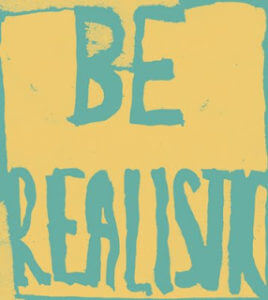
5. There are no failures only set backs
I think before you start, it’s important to go into this realising that you are going to make mistakes. Chances are you are going to fail, not once but numerous times. Perhaps many times! Failing doesn’t mean that you have to stop and give up. It just means you are human and it’s an experience to learn and improve from. If you mess up, then move on and get back on track again. With time you are likely to fail less and less. Look at failures as obstacles on your journey towards success and not as an ultimate end point. With this attitude, you cannot be beaten.
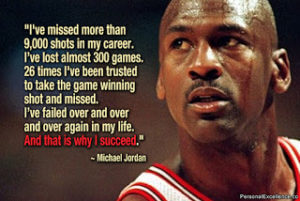
-Evan
Make sure you reach your fitness goals by ordering My Fitness Kitchn’s delicious healthy meals that are delivered in Sydney!
Website – http://www.muscleacademy.com.au
Facebook – http://www.facebook.com/MuscleAcademy
Instagram and Twitter – @evansoooon

